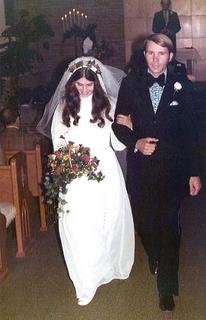Warning: a couple of paragraphs discuss sensitive topics
Sorry this turned out to be so long, but I just wanted to get it out:o)
Education is one of my favorite topics, and I do have pretty strong opinions about it! But, I just wanted to clarify a couple of things I posted earlier in "Wisdom and Education: Not Always the Same", that perhaps did not come out right:
I am not against higher education. I graduated from college myself, and am glad that I did. But I do think that college is not for everyone, and shouldn't be culturally mandated as the only way of preparing for a career or becoming further educated. So much wisdom can be gained by reading great books and discussing ideas with others. In fact, those are some of the things I most loved about college...the reading and the discussion...although I probably could have pursued them in another way if I had really tried.
My motivation for going to college was never to prepare for a big career. For the most part, I just wanted to learn and broaden my horizons. I wanted to improve my writing (thus I majored in English). I also wanted to improve my social skills, as I knew myself to be rather shy. I wanted to combine my studies with travel and see different parts of the world, so I studied abroad during my junior year and
loved it! An unplanned (though not entirely unhoped for) benefit of college for me is that I met my now-husband there in September of 2001:o)
Because I was not just going to college to earn a piece of paper--I was going to actually learn--the quality of the education was very important to me. I wanted to gain wisdom, not just information. I did not want to spend four years being bombarded with opinions based upon a worldview that I did not believe.
Before college, I was home-educated all the way through high school. During high school, this meant that most of my education was obtained mainly through reading on my own and taking private classes or jr. college classes a few days a week. I took a couple English classes at the jr. college in order to get college credit for cheap (free tuition, actually), and was very disappointed with them. Instead of studying literature and really examining the issues and ideas there, we read nothing but politically and socially sanitized essays and discussed our "feelings" about this and that. Of course, everyone has different "feelings" so our many hours of discussion never progressed beyond a forum for relativism and learning tolerance. I remember thinking: of course, we should be tolerant of people who are different. But if secular education means that we can never state any idea as absolute truth--therefore, by necessity superior to other ideas--then what is the point? If all ideas are relative, and education is nothing but tolerance conditioning, there is no point.
I understand that what I stated above relates more heavily to the liberal arts. Most math professors, for instance, are willing to agree that there are absolutes within the study of math. Most science instructors admit that there are scientific absolutes, although there is some disagreement about what constitutes an absolute and what is merely a theory (ie, macro-evolution).
On the flip-side of what I experienced at the jr. college, many others who attend secular universities find that some liberal arts professors
do infuse their lessons with
absolutes, though they are often inconsistent or don't make sense or are just plain wrong, according to what God says (which to Christians, of course, reigns supreme over what man says). For example, my best friend signed up for a Western Literature class at a state school, and instead was treated to a class on "gay literature". Oh, it was still all the old classics...Dante, Shakespeare, etc...but apparently everybody was gay. Most of the authors were gay, most of the characters were gay, and most of the readings related to gay themes. Did you know that several hundred years ago, everybody was gay and all the writing was about being gay? A few more examples of absolutes often taught at secular universities: Capital punishment for murderers is inhumane. Abortion is about choice for the woman and is not inhumane (Wait...is the question of whether the fetus is a human being or not dependent on what it's mother
thinks or
wants?). Hitler was evil. War is wrong (including WWII?). We should be tolerant of everyone's ideas and seek to understand their motives. Christian ideas are dangerous and harmful to society. Is this consistency? I could give more examples, but this is getting long enough.
My main point here, is that for the Christian who believes in the absolutes which God has established, secular liberal arts education is probably not the most helpful option. Even an athiest or humanist would probably find a different type of educational model than what we mostly have in the US to be more helpful...one which demands consistency. (I was very impressed with the Oxford University model--students meet individually with tutors and present their research--because it requires the students to really think and to support and defend their ideas.)
My own choices about education reflect all that I've shared here. When I graduated from high school, I selected a private university based upon a consistent Christian worldview. A good Christian school will not censor all material that goes against the tenets of Christianity, but will encourage students to examine it according to God's absolutes. We studied things like macro-evolution, culture, and various religions at my school. But we did it with the purpose of better understanding our world, what others believe, and why God says what He does about things. In
ALL cases, I found my own faith confirmed even more when compared with the many ideas that go against it.









